
Universal Access in the Information Society
Scope & Guideline
Empowering voices through accessible information systems.
Introduction
Aims and Scopes
- Accessibility and Usability Research:
The journal publishes studies focusing on evaluating and improving the accessibility and usability of digital platforms, applications, and services for individuals with disabilities. - Assistive Technologies Development:
A core area of focus is the development and assessment of assistive technologies that support individuals with disabilities, including augmented reality, voice recognition, and other innovative solutions. - Inclusive Design Practices:
Research in this journal advocates for inclusive design principles, ensuring that products and services are developed considering the needs of all users, particularly marginalized groups. - Impact of Digital Inclusion:
The journal explores the socio-economic impacts of digital inclusion initiatives, analyzing how technology can bridge gaps for underrepresented communities. - Cross-Disciplinary Approaches:
A unique aspect of the journal is its emphasis on cross-disciplinary methodologies, integrating insights from computer science, social sciences, and design to address accessibility issues.
Trending and Emerging
- AI and Machine Learning in Accessibility:
There is a notable increase in research exploring the application of artificial intelligence and machine learning to enhance accessibility, including automated captioning and personalized user experiences. - Augmented and Virtual Reality Applications:
Emerging studies focus on the use of AR and VR technologies to create immersive and accessible environments, particularly for educational and therapeutic purposes. - Cognitive Accessibility:
Research on cognitive accessibility is on the rise, addressing the specific needs of users with cognitive impairments and emphasizing the importance of tailored design. - Community Engagement and Participatory Design:
An increasing number of publications emphasize the role of community engagement and participatory design in developing accessible technologies that meet the real needs of users. - Digital Health and Telemedicine:
The impact of digital health solutions, especially during and after the COVID-19 pandemic, has emerged as a critical area of focus, examining how technology can improve health outcomes for individuals with disabilities.
Declining or Waning
- General Accessibility Guidelines:
Research focused solely on broad accessibility guidelines, such as WCAG compliance, has seen a decrease as the field moves towards more nuanced, user-centered approaches. - Assistive Technology for Specific Disabilities:
There is a waning interest in studies that target assistive technologies for specific disabilities in isolation, as the trend shifts towards more holistic, integrated solutions that cater to multiple user needs. - Traditional Usability Testing Methods:
The reliance on traditional usability testing methods has diminished, with more emphasis on innovative, context-aware evaluation techniques that consider the dynamic needs of users.
Similar Journals

Journal of Usability Studies
Enhancing interactions through rigorous research and analysis.The Journal of Usability Studies, published by the USERS EXPERIENCE PROFESSIONAL ASSOCIATION, is a pivotal platform for researchers and professionals dedicated to advancing the field of usability and user experience design. With an ISSN of 1931-3357, this journal offers a collection of peer-reviewed articles that explore innovative methodologies, emerging technologies, and applied research in usability studies. Though it operates under a traditional access model, the journal remains dedicated to fostering a detailed understanding of how users interact with systems and products. The Journal of Usability Studies is instrumental for those aiming to enhance user satisfaction through research-backed insights, making it a vital resource for academics, practitioners, and students seeking to contribute to the evolving discourse in human-computer interaction and usability engineering.
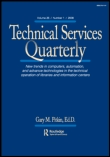
Technical Services Quarterly
Bridging the gap between technology and information management.Technical Services Quarterly, published by Routledge Journals, Taylor & Francis Ltd, is a critical platform for the dissemination of scholarly research in the fields of Library and Information Sciences as well as Computer Science Applications. With an established history dating back to 1984, this journal has fostered a vibrant academic community and continues to thrive with a robust publication strategy aimed at enhancing technical services in libraries. As a Q3-ranked journal in Computer Science Applications and Q2 in Library and Information Sciences for 2023, it provides a compelling opportunity for researchers and professionals to contribute to and engage with cutting-edge developments in these disciplines. While currently not an open-access journal, Technical Services Quarterly ensures that its content remains relevant and impactful by maintaining rigorous peer-review standards and a commitment to scholarly excellence. With a focus on practice-oriented research and empirical studies, it encourages contributions that further the understanding of evolving technologies and their applications within the library sector, making it an essential read for academics and practitioners alike.
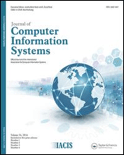
JOURNAL OF COMPUTER INFORMATION SYSTEMS
Connecting Research and Innovation in TechnologyThe JOURNAL OF COMPUTER INFORMATION SYSTEMS, published by Taylor & Francis Inc, is a prestigious academic journal dedicated to the fields of computer science and information systems. With an ISSN of 0887-4417 and an E-ISSN of 2380-2057, this journal has been a valuable resource since its inception in 1995, contributing to the convergence of research until 2024. The journal holds significant status in its respective categories, achieving a Q2 ranking in Computer Networks and Communications, and a Q1 ranking in Education, demonstrating its impact and relevance to a broad academic audience. With Scopus rankings placing it in the 90th percentile for Social Sciences - Education and respectable standings in Computer Science, it serves as a critical forum for the dissemination of innovative research, methodologies, and case studies within the domains of computer information systems. Although not an open-access journal, it remains a highly cited source, attracting researchers, educators, and professionals seeking to enhance their knowledge and contribute to the evolving discourse in technology and education.

Human-centric Computing and Information Sciences
Empowering Innovation Through Human-Centric InsightsHuman-centric Computing and Information Sciences, published by the Korea Information Processing Society, represents a leading platform in the field of computer science, particularly focusing on the interaction between humans and computational systems. With an impressive Q1 ranking in the 2023 category of Computer Science (miscellaneous) and a commendable Scopus rank of #14/232 (94th percentile), this journal has established itself as a cornerstone for researchers and practitioners dedicated to advancing understanding in this vital area. Understanding the significance of making technology more accessible and effective for users, the journal has been an Open Access publication since 2011, promoting wide dissemination of knowledge without barriers. The journal's scope encompasses innovative methodologies, user experience design, and the integration of human factors into computing environments, making it essential reading for anyone interested in the intersection of technology and society. With all articles freely accessible, the journal not only contributes to scholarly discourse but also encourages collaboration among researchers worldwide, fostering further advancements in human-centric computing.
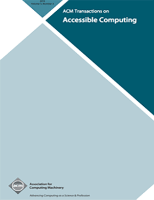
ACM Transactions on Accessible Computing
Fostering innovation for diverse accessibility needs.ACM Transactions on Accessible Computing, with ISSN 1936-7228 and E-ISSN 1936-7236, is a prestigious journal published by the Association for Computing Machinery. Established to advance the field of accessible computing, this journal plays a critical role in promoting research that enhances the usability of computer technology for individuals with diverse accessibility needs. Its impact is reflected in its 2023 Scopus rankings, placing it in the Q2 category for Computer Science Applications and Q3 for Human-Computer Interaction, making it a significant resource for researchers and practitioners alike. With an ongoing publication timeline from 2008 through 2024, the journal not only contributes to theoretical advancements but also addresses practical implications in the realm of inclusive design and innovation. Although not Open Access, the journal is a vital forum for disseminating cutting-edge research, ensuring that advancements in technology are accessible to all.

INFORMATION SYSTEMS FRONTIERS
Shaping the Future of Information Systems Through Rigorous ResearchINFORMATION SYSTEMS FRONTIERS, published by Springer, stands at the forefront of interdisciplinary research in the fields of Computer Networks, Information Systems, Software Engineering, and Theoretical Computer Science. Since its inception in 1999, the journal has established itself as a highly regarded source of innovative research, reflected in its impressive Q1 status across multiple categories as of 2023, indicating a prominent position in the academic landscape. With a dedicated focus on disseminating cutting-edge findings and fostering a better understanding of complex information systems, this journal serves as an essential platform for researchers, professionals, and students alike. Authors benefit from a rigorous peer-review process, while readers gain access to pivotal advancements that drive the evolution of technology and information processing. Located in the Netherlands, the journal is poised to continue shaping the discourse in information systems until its converged years of 2024 and beyond.

Bibliotecas-Anales de Investigacion
Empowering Voices in Library ResearchBibliotecas-Anales de Investigacion is a prominent scholarly journal dedicated to the field of Library and Information Sciences, published by BIBLIOTECA NACL CUBA JOSE MARTI, with its esteemed presence based in Havana, Cuba. This journal (ISSN: 0006-176X, E-ISSN: 1683-8947) plays a crucial role in disseminating research and insights relevant to the evolving landscape of library operations, information management, and user services. Acknowledged for its rigorous peer-review process, it is indexed in Scopus, currently classified in the 2023 Q4 quartile, ranking 199 out of 280 in its category, marking a significant contribution to the academic community despite its modest percentile of 29th. The journal welcomes original research articles, case studies, and reviews that explore contemporary issues and developments in library science, creating an inclusive platform for both seasoned scholars and emerging voices. Interested readers can anticipate a robust exploration of topics from information retrieval to digital libraries, aligning with the journal's objective to enhance knowledge and practice within the library and information sector. As the journal converges its themes from 2019 to 2024, it remains a vital resource for researchers, professionals, and students aiming to stay informed on the latest trends and innovations in the field.
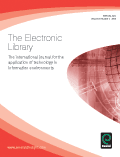
ELECTRONIC LIBRARY
Advancing Research in Electronic Resource ManagementELECTRONIC LIBRARY, published by EMERALD GROUP PUBLISHING LTD, serves as a pivotal resource in the realms of Library and Information Sciences as well as Computer Science Applications. Established in 1983 and continuing through 2024, this journal showcases critical research and developments that shape modern information practices and the utilization of electronic resources. With a respectable impact factor positioning it in the Q2 quartile for Library and Information Sciences and Q3 for Computer Science Applications, the journal ranks #57 out of 280 in its field, reflecting its significance within the scholarly community. Authors are encouraged to contribute innovative studies that engage with current challenges and technological advancements, ensuring that the ELECTRONIC LIBRARY remains at the forefront of academic discourse. While the journal does not currently offer open access options, it remains an essential subscription-based resource for researchers, professionals, and students seeking to deepen their understanding of digital libraries and information management.
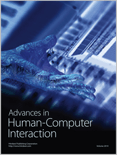
Advances in Human-Computer Interaction
Unlocking the potential of human and computer synergy.Advances in Human-Computer Interaction is a premier peer-reviewed journal published by HINDAWI LTD, dedicated to the exploration of cutting-edge research and innovation in the field of Human-Computer Interaction (HCI). With an ISSN of 1687-5893 and an E-ISSN of 1687-5907, this Open Access journal has been contributing to the scientific community since 2008, offering unrestricted access to critical findings and advancements. Based in Egypt with an address at ADAM HOUSE, 3RD FLR, 1 FITZROY SQ, LONDON W1T 5HF, ENGLAND, it occupies a notable position in the academic landscape, reflected in its 2023 Scopus ranking of Rank #57/145 and a 61st percentile in the Human-Computer Interaction category. As a Q3 journal, it plays a crucial role in disseminating research that bridges the gap between humans and technology, providing valuable insights for researchers, professionals, and students pursuing expertise in this dynamic field. The journal’s converged years from 2010 to 2024 signify its ongoing commitment to advancing knowledge and fostering collaboration among HCI experts worldwide.
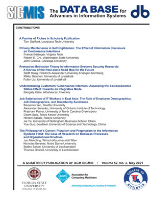
DATA BASE FOR ADVANCES IN INFORMATION SYSTEMS
Unveiling the Future of Data Management and RetrievalDATA BASE FOR ADVANCES IN INFORMATION SYSTEMS, published by the Association for Computing Machinery, is a pivotal journal in the field of information systems, offering a platform for researchers and professionals to disseminate innovative findings and emerging trends. With its ISSN 0095-0033, this journal encompasses a broad spectrum of topics including data management, information retrieval, and systems architecture, making it a vital resource for scholars and practitioners keen on advancing knowledge in these areas. Although not an Open Access journal, it remains accessible through various academic institutions and libraries, maintaining its reputation as a cornerstone of scholarly communication. By fostering academic discourse, DATA BASE FOR ADVANCES IN INFORMATION SYSTEMS is committed to enhancing the quality and impact of research in the information systems domain, aiming to inspire the next generation of professionals and researchers.